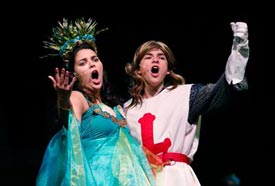“What is safe water?” asked Dr. Daniele Lantagne as she spoke to students about the roles math and science play in her work on household water treatment in developing countries.
Dr. Lantagne ‘s research focuses on developing, implementing and assessing the effectiveness of water and sanitation interventions in developing countries and emergency contexts. She worked for the CDC for eight years, and 75 percent of her time was spent traveling to more than 50 countries. She explained to students how she went from an undergrad at M.I.T. to a scientist landing on a remote airstrip and hiking three days to get to her destination. When she’s in the field, she works closely with local populations, coordinating safe water techniques while also considering the economic realities and culture of the area.
“You often don’t see where your career is headed at the beginning,” she says. “My main technical skill is treating water with chlorine, which is the one thing I do really, really well. Then I do a lot of other things pretty well. My advice to you, as you pursue college and careers, is to establish yourself with a core skill and then branch out from there.” Dr. Lantagne recently worked on a chlorine how-to worksheet for Ebola healthcare workers.
Dr. Lantagne is an assistant professor in the Civil and Environmental Engineering department at Tufts University. Her talk, “Applications of Science and Math: Preventing cholera and diarrheal disease in developing countries,” is part of a speaker series, Pi Talks: Mathematical Conversations With Dessert, organized by the math department.


